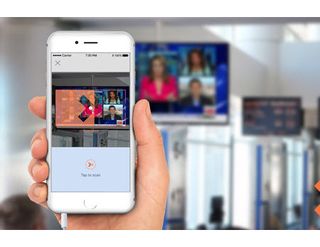Tunity Tunes In Out-of-Home Viewing

Tunity, a startup that has built a mobile app that lets users hear live audio streams while viewing muted televisions, has snatched a sizable round of funding as it looks to pursue a business model based on providing key insights on out-of-home TV viewing, as well as targeted advertising opportunities.
Fresh off a $12 million A round — and a signed partnership with MGM Resorts — Tunity is now starting to fine tune its business plans, along with its mobile app and cloud-based platform; together, the app and platform enable consumers watching muted TVs in venues such as sports bars, airports, waiting rooms or gyms to stream a channel’s synced-up audio feed on their smartphones.
Tunity claims its app, available for Android and iOS mobile devices, has been downloaded more than 1.5 million times. It currently supports more than 100 channels in the U.S., including ABC, AMC, Bravo, CBS, CNN, Cartoon Network, Discovery Channel, ESPN and beIN Sports, among dozens of others.
To enable the video-audio synchronization, users of Tunity’s mobile app are directed to scan nearby TVs so its cloud-based deep learning technology can identify the live video stream and match it with the right audio feed, which is then streamed to the user’s smartphone.
Under this process, the scan from the user’s mobile phone sends that information, including a few captured video frames and the user’s location, to Tunity’s platform, which analyzes the images and the location to determine the correct live TV channel.
From there, it creates a system time stamp to ensure that the audio that’s streamed to the smartphone is synchronized as closely as possible to the video that users are viewing.
New Stamping Grounds
As for that deep-learning bit, Tunity uses all of this data to constantly “train” its servers to improve its time-stamping and synchronization capabilities.
Rather than one-off attempts at this synchronization, Tunity’s system has an historical database that, it claims, helps the system’s “neural network” become better over time on an almost linear basis, Yaniv Davidson, Tunity’s founder, explained. “The more data you have, the better your algorithm and the better that your neural network works,” he said.
Related: Big Data Getting Bigger Thanks to Mobile Apps, Report Says
Tunity’s location-based system (using the phone’s WiFi or cellular connection) is also in place to ensure that users are getting the audio when they are in front of or somehow nearby the TV, and can’t simply set the scan to receive the audio stream and then go on their merry way. If users move away from the TV (perhaps by as much as 100 to 160 meters), the audio stream is shut off and they are given a notice to rescan in order to restart it.
Tunity is experimenting with its business models and exploring future revenue opportunities.
Selling data and insight on out-of-home viewing to programmers and other partners is a model that it’s initially looking into.
For its part, Nielsen has acknowledged that out-of-home viewing provides a ratings lift, albeit one that varies by programming type, viewer demographic and age group. Recent data from Nielsen, for example, found that 26% of OOH impressions came from viewers 18-34, versus 32% from viewers 55 or older. However, nearly 60% of OOH impressions come from the core buying demographic, according to Nielsen.
“Out-of-home is going to become a more important part of linear TV,” Davidson said, hopeful that Tunity’s data can complement existing ratings systems or provide some additional second-by-second data to networks.
Tunity is also taking a look at how it can create targeted advertising that is relevant to what the viewer is watching.
Tunity conducted a small experiment during a televised NASCAR race where a native pop-up on the phone asked viewers if they wanted to pre-order the racing game NASCAR Heat Evolution. They could decline it or accept it. If accepted, they would be sent to a dedicated landing page to complete the pre-order process. Davidson said the experiment saw a 20% click-through rate.
Founded in 2014, Tunity has about 20 employees, with offices in New York and Israel.
Multichannel Newsletter
The smarter way to stay on top of the multichannel video marketplace. Sign up below.
